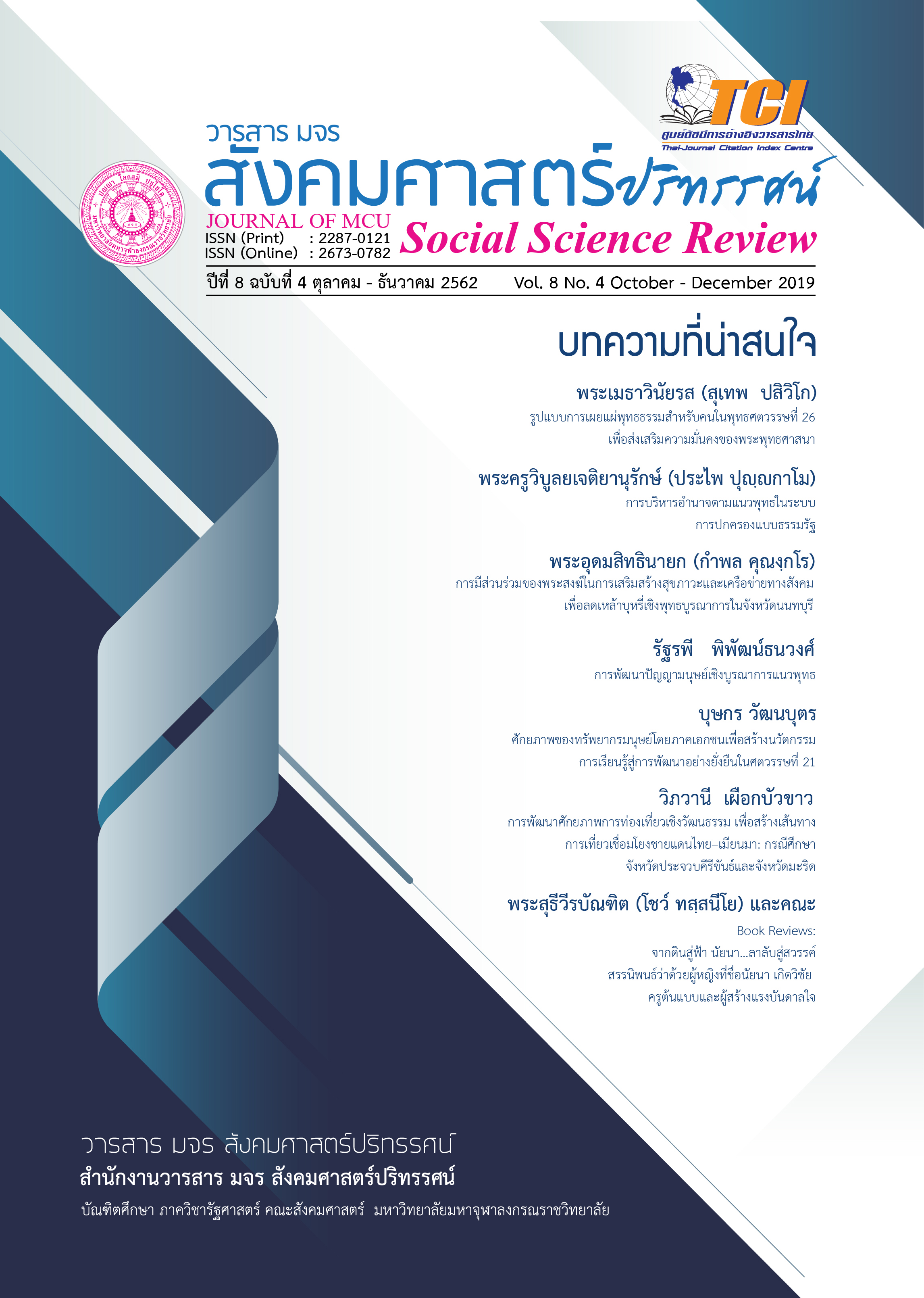การประยุกต์ใช้หลักอปริหานิยธรรมเพื่อการจัดการสภาองค์กรชุมชนเข้มแข็ง ในจังหวัดระยอง
คำสำคัญ:
สภาชุมชน, การจัดการความเข้มแข็ง, อปริหานิยธรรมบทคัดย่อ
ดุษฎีนิพนธ์ฉบับนี้มีวัตถุประสงค์ 3 ประการคือ 1. เพื่อศึกษาบริบททั่วไปของสภาองค์กรชุมชนจังหวัดระยอง 2. เพื่อศึกษาปัจจัยที่ส่งผลต่อการจัดการสภาองค์กรชุมชนเข้มแข็งจังหวัดระยอง และ 3. เพื่อเสนอแนวทางการประยุกต์ใช้หลักอปริหานิยธรรมสนับสนุนการจัดการสภาองค์กรชุมชนเข้มแข็งในจังหวัดระยอง ระเบียบวิธีวิจัยเป็นแบบผสานวิธี การวิจัยเชิงคุณภาพเก็บข้อมูลจากผู้ให้ข้อมูลสำคัญจำนวน 20 คน และการสนทนากลุ่มกับผู้ทรงคุณวุฒิที่มีความเชี่ยวชาญเรื่องสภาองค์กรชุมชน โดยใช้วิธีการเลือกแบบเจาะจงและวิเคราะห์โดยวิธีการวิเคราะห์เนื้อหาเชิงพรรณนา การวิจัยเชิงปริมาณเก็บข้อมูลจากกลุ่มตัวอย่างคือประชาชนในจังหวัดระยอง จำนวน 400 คน ซึ่งสุ่มโดยใช้สูตรของทาโร่ ยามาเน่ จากประชากรจำนวน 700,223 คน เครื่องมือที่ใช้ในการเก็บรวบรวมข้อมูลคือแบบสอบถาม มีค่าความเชื่อมั่นทั้งฉบับเท่ากับ 0.980 สถิติที่ใช้ในการวิเคราะห์ข้อมูล ได้แก่ ความถี่, ร้อยละ, ค่าเฉลี่ย และค่าเบี่ยงเบนมาตรฐาน ผลการวิจัยพบว่า 1. บริบททั่วไปของสภาชุมชนในจังหวัดระยองมีการจัดกิจกรรมให้กับสมาชิกไม่แน่นอน และคนในชุมชนพึงพอใจมากที่สุดกับการมีส่วนร่วมการเลือกตั้ง แต่ควรจะพัฒนาเรื่องการแก้ปัญหาที่รวดเร็ว สภาองค์กรชุมชนจังหวัดระยองส่งเสริมการมีส่วนร่วมในการสร้างธรรมนูญชุมชนด้วยคนในชุมชน และภาครัฐให้ความร่วมมือในการศึกษาภูมิปัญญาท้องถิ่น การเกิดขึ้นของผู้นำตามธรรมชาติที่ไม่ได้มาจากการเลือกตั้ง แต่มาจากความรู้ ความสามารถ และประสบการณ์ที่เป็นที่ยอมรับของคนในชุมชน ปราชญ์ชาวบ้านคือผู้ถ่ายทอดความรู้ ความสามารถ และประสบการณ์สู่คนในชุมชน เช่น วิถีชีวิต, วัฒนธรรมการทำอาหาร, การถนอมอาหาร, หรือการรักษาโรค ยาสมุนไพร เพื่อเป็นแนวทางในการดูแลสุขภาพที่เคยปฏิบัติตามกันมาในอดีต ปัญหาในชุมชนคือ คนในชุมชนให้ความสำคัญกับความรู้สมัยใหม่ ละเลยต่อภูมิปัญญาท้องถิ่นที่มีมาแต่อดีตซึ่งค่อยๆจางหายไปจากสิ่งแวดล้อมและวิถีชีวิตของคนในชุมชน 2. ปัจจัยที่ส่งผลต่อการจัดการสภาชุมชนเข้มแข็งโดยทฤษฎี POSDCoRB อยู่ในระดับมาก 1) ด้านการวางแผน มีการวางแผนระยะสั้น ระยะยาว เชิงรุก และเชิงรับ 2) ด้านการจัดการ กำหนดหลักการบริหารและมีสายการบังคับบัญชาที่ชัดเจน 3) ด้านการบริหารบุคลากร สรรหาและคัดเลือกบุคลากรที่มีความรู้ ความสามารถ และมีทัศนคติที่ดี 4) ด้านการสั่งการ มีความเหมาะสม ยุติธรรม และสนับสนุนซึ่งกันและกัน 5) ด้านความร่วมมือ สร้างเครือข่ายการมีส่วนร่วมซึ่งกันและกัน 6) ด้านการรายงาน มีการบันทึกอย่างสม่ำเสมอและมีความซื่อสัตย์ และ 7) ด้านงบประมาณ ใช้จ่ายอย่างเพียงพอ คุ้มค่า และตรวจสอบได้ 3. การประยุกต์ใช้หลักอปริหานิยธรรมในการสนับสนุนการจัดการสภาองค์กรชุมชนเข้มแข็งในจังหวัดระยองอยู่ในระดับมากที่สุด จำแนกตามรายด้านคือ 1) ด้านการวางแผน หมั่นประชุมอย่างสม่ำเสมอ พร้อมเพรียง กำหนดกฎระเบียบอย่างมีเหตุผล และเคารพผู้รู้ 2) ด้านการจัดการ กำหนดกฎเกณฑ์อย่างมีเหตุผล และเคารพในบทบาทของสตรี 3) ด้านการบริหารบุคลากร เคารพผู้ที่มีความรู้ ความสามารถ และให้โอกาสสตรีเพศ 4) ด้านการสั่งการ กำหนดกฎเกณฑ์อย่างมีเหตุผล ส่งเสริมและรักษาวัฒนธรรมที่ดี ตลอดจนปกป้องพระพุทธศาสนา 5) ด้านความร่วมมือ หมั่นประชุมอย่างสม่ำเสมอ พร้อมเพรียง ตลอดจนส่งเสริมและรักษาไว้ซึ่งวัฒนธรรมที่ดี 6) ด้านการรายงาน รายงานอย่างซื่อสัตย์ตามกฎระเบียบที่กำหนดไว้ 7) ด้านงบประมาณ คุ้มค่า เหมาะสม เป็นการนำหลักธรรมทางพระพุทธศาสนามาประยุกต์ใช้ภายใต้ประเพณีดั้งเดิมซึ่งเป็นสิ่งที่อยู่คู่กับชุมชนมายาวนาน
เอกสารอ้างอิง
Permanent Secretary Surapong Thitayano (Kaewko). (2012). “Analysis of Local Government Administrative Organization in the Principles of Moral Aparihaniya Dhamma: A Case Study of Kham Yai Sub-district, Mueng Ubon Ratchathani, Ubon Ratchathani Province”, A Thesis of Master degree in Buddhism, Graduate Studies: Mahachulalongkornrajavidyalaya University.
Phrathanongsak Duenkhunthot. (2018). “Procedural Model for Youth Dharma Practice Programs to Strengthen Southern Isan Communities”, Journal of MCU Social Science Review, 7 (1) (January - March): 252.
Prasan Boonsopak, Sriracha Charoenpanich and Puangpaka Boonsopak, (2009). “Education Report act Community Organization Council B.E.2551”, Research Report, (Community Development Institute: Public Organization).
Salinthip chiengthong. (2013).“The role of the Community Council in enhancing the democratic learning of community members”, A Thesis of Master degree in Public Policy and Public Management, Graduate Studies: Mahidol University.
Pojchanart Intaramanon. (2018). Participation and sustainable development. [Online]. Source: ้https://www.academia.edu [2 October 2018].
ดาวน์โหลด
เผยแพร่แล้ว
รูปแบบการอ้างอิง
ฉบับ
ประเภทบทความ
สัญญาอนุญาต
ลิขสิทธิ์ (c) 2019 วารสาร มจร สังคมศาสตร์ปริทรรศน์

อนุญาตภายใต้เงื่อนไข Creative Commons Attribution-NonCommercial-NoDerivatives 4.0 International License.
เพื่อให้เป็นไปตามกฎหมายลิขสิทธิ์ ผู้นิพนธ์ทุกท่านต้องลงลายมือชื่อในแบบฟอร์มใบมอบลิขสิทธิ์บทความให้แก่วารสารฯ พร้อมกับบทความต้นฉบับที่ได้แก้ไขครั้งสุดท้าย นอกจากนี้ ผู้นิพนธ์ทุกท่านต้องยืนยันว่าบทความต้นฉบับที่ส่งมาตีพิมพ์นั้น ได้ส่งมาตีพิมพ์เฉพาะในวารสาร มจร สังคมศาสตร์ปริทรรศน์ เพียงแห่งเดียวเท่านั้น หากมีการใช้ภาพหรือตารางหรือเนื้อหาอื่นๆ ของผู้นิพนธ์อื่นที่ปรากฏในสิ่งตีพิมพ์อื่นมาแล้ว ผู้นิพนธ์ต้องขออนุญาตเจ้าของลิขสิทธิ์ก่อน พร้อมทั้งแสดงหนังสือที่ได้รับการยินยอมต่อบรรณาธิการ ก่อนที่บทความจะได้รับการตีพิมพ์ หากไม่เป็นไปตามข้อกำหนดเบื้องต้น ทางวารสารจะถอดบทความของท่านออกโดยไม่มีข้อยกเว้นใดๆ ทั้งสิ้น





